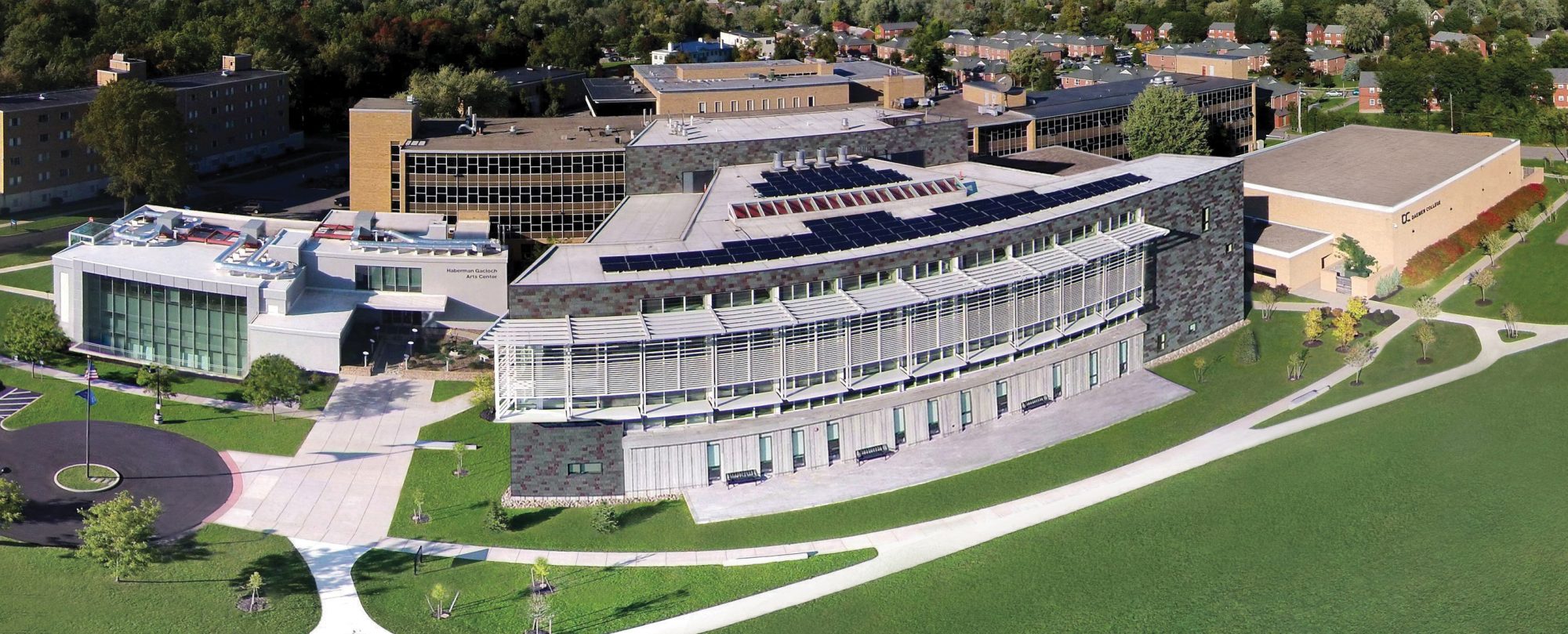Core Curriculum
All degree programs require completion of the Core Curriculum. A complete description of the core and its requirements is available in the Core Curriculum section of the Daemen catalog. Courses which satisfy a portion or complete a core requirement will have such designation indicated after the course title.
-
MAJOR AND SPECIALIZATION: 63 CREDITS
MAJOR: 33 credits
-
- IND/SUST123 Introduction to Sustainable Communities (3) – CI; CT
- SUST140 Sustainability Design Seminar I (3)
- SUST240 Sustainability Design Seminar II (3)
- SUST340 Sustainability Design Seminar III (3)
- SUST440 Sustainability Design Seminar IV (3)
- SUST443 Capstone Research in Sustainability (3) – ILIT; RP; WI
-
SELECT ONE (3 CREDITS):
- BIO302 Ecology (3)
- ENS201 Introduction to Environmental Science (3) – CT
- ENS304 Environmental Chemistry (3)
-
SELECT FOUR (12 CREDITS):
- BIO/SUST304 Conservation Biology (3) – CI; CR; ME; WI
- ENS/SUST310 Global Water Issues (3) – CI; ILIT
- HPR308 Environmental Health (3) — CT
- HPR335 Critical Issues in Global Health (3) – CI
- IND/SUST322 Alternative and Renewable Energy Issues (3) – CI; CT
- IND/SUST326 Green Buildings (3) – CC; CT; AA
- IND/SUST338 Food & Agriculture Issues (3) – CI
- IND/SUST344 Sustainable Business Practices (3) – CI; ME
- IND/SUST351 Urban Planning & Community Development (3) – CI; CR
SPECIALIZATION: 30 credits
-
- Area of specialization will be based upon the student’s interests and courses will be selected in consultation with and approval of the Sustainability Department Chairperson.
- 18 credits must be completed at the 300-level or above
2. CORE: 45 CREDITS
-
- CMP101 English Composition (3) – CS; ILIT; WI
- IND101 Sustainable & Critical Relationships (3)
- Select one (3 credits):
- CMP311 Advanced English Composition (3) – CS; ILIT; UD; WI
- CMP315 Advanced Composition for Health Professionals (3) – CS; ILIT; UD; WI
- Select one (3 credits):
- MTH104 Survey of Statistics (3) – CT; QL
- NSC310 Biostatistics (3) – CT; UD
- PSY333 Statistics for Psychology and Social Sciences (3) – CT; QL
- MGQ221 Business Statistics I (3) – QL
- Select one (3 credits):
- BA220 Diversity and Cross Cultural Management (3) – AA; WI
- SOC224 Ethnicity, Race & Cultural Diversity (3) – AA; WI
- Select one (3 credits):
- ECO201 Principles of Microeconomics (3) – CT
- ECO202 Principles of Macroeconomics (3) – CT
- ECO206 The Economics of Sustainable Development (3) – CT
- ECO213 Economics of Inequality (3) – CT
- ECO343 Global Economic Geography (3) – CR; UD
- Select two (6 credits):
- HP/IND250 Introduction to Historic Preservation (3) – CI
- HST222 Urban America (3) – CT
- HST230 Problems of the Third World (3)
- HST324 Global Environmental History (3) – CR; UD
- IND120 Introduction to Global Studies (3) – CI
- PSC113 American Politics (3) – CR
- PSC114 State & Local Government (3) – CR
- PSC121 International Relations (3) – CI
- PSC125 Public Policy Making (3) – CT
- PSC210 The Politics of Globalization (3) – CI
- PSC213 Sustainability and Third World Development (3) – CI
- PSC231 International Organizations and Global Governance (3) – CI
- Foreign Language and Core Electives: 21 credits
- Foreign Language Requirement: Students must demonstrate proficiency in a foreign language through the intermediate level. The requirement may be satisfied through the completion of college level coursework or the successful completion of a proficiency examination. A complete description of the requirement is available in the Foreign Language section of the Daemen catalogue.
3. INTERNATIONAL EXPERIENCE AND FREE ELECTIVES: 15 CREDITS
-
- International Experience: Students are required to complete one or more community-based international experiences subject to the approval of the Department Chairperson. The experience(s) may include internships, additional language studies, pre-approved studies taken elsewhere. The experience(s) may or may not result in credit earned.
- Free Electives: Courses used to fulfill the free electives are not required to have a competency. A maximum of 6 credits may be taken in Sustainability courses.
TOTAL PROGRAM REQUIREMENTS = 123 CREDITS
Requirements for Admission; Admission to Upper Division; Graduation – consult the Sustainability section of the catalog or the Program Plans site on the Registrar’s web page.
Suggested Course Sequence
Access the course sequence for the BA, Global and Local Sustainability, from the Sustainability web page or the Program Plans site on the Registrar’s web page.

